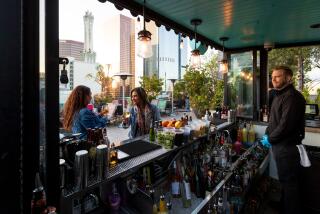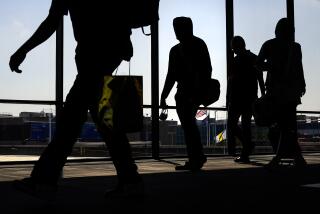Fuel fees pump up airfares
- Share via
Flying to Tokyo this spring? United Airlines last week offered a round-trip flight for as little as $400 -- plus $300 in fuel charges.
With oil prices high, fuel surcharges on many international flights have climbed in recent months to nearly half the price of a ticket. U.S. visitors to Spain can expect to pay up to $390 in fuel surcharges for a round-trip flight. Air New Zealand imposes up to $360 in fuel fees.
There doesn’t seem to be any relief in sight as fares surge with the price of fuel.
“It’s getting out of hand,” said passenger Don Roberts, a Studio City resident, as he waited to board a Japan Airlines flight to Tokyo at Los Angeles International Airport last week. The carrier earlier this month raised the fuel surcharge to $282, up from $50 last year, on a round-trip ticket.
In the U.S., major airlines charge about $20 in fuel fees for domestic flights. On Monday, they doubled the surcharge to $40. It marked the third time they have tried to pass on the cost of fuel to passengers, but each time consumers have balked at buying the more expensive tickets.
Even with prospects that a global economic downturn could discourage travel and prompt lower prices, high fuel costs stand to limit any fare wars that might break out this year.
The fuel charges are generally hidden in a ticket’s fine print under “taxes and fees.” In the past, most airlines factored higher fuel costs into the fare. But in recent years, carriers have opted to pass on the expense as a separate surcharge, which they hope consumers will accept more readily.
“When you say ‘fuel surcharge,’ people understand it right off the bat because they see it at the gas stations,” said Diane Embree, travel consultant for Michael’s Travel Centre in Westlake Village. Embree these days breaks down the cost of each ticket, including the fuel surcharge, base fare and other taxes and fees when issuing a ticket for a customer. “They don’t like it, but at least they know what that means.”
Also, strong demand for international travel has made airlines more willing to increase fuel surcharges on international flights, analysts said.
At LAX, one of the nation’s busiest airports for international travel, the number of international passengers jumped 8% in November, the most recent period for which figures are available. On Korean Air, most of its three daily fights from L.A. to Seoul are 100% booked for economy section and 90% full for business, the airline said.
Roberts, a professional saxophone player, said he had little choice but to pay the surcharge because his work involves performing overseas, making travel mandatory. “It’s not something I can do anything about,” Roberts said.
But travel agents said the latest increase in surcharges was prompting passengers to modify their travel plans.
“Travelers are cutting back on the length of the trip or more likely the type of accommodations,” Embree said. “They’re also planning on spending less on souvenirs or meals.”
In Hawaii, the number of families visiting from Japan, a key source of tourism revenue for the island chain, are “definitely being impacted by these surcharges,” said Takashi Ichikura, executive director of Hawaii Tourism Japan.
A family of four now has to pay more than $1,000 in fuel surcharges for a flight from Tokyo to Honolulu. As a result, Ichikura said, families are choosing alternative vacation destinations closer to Japan, such as Okinawa, where there are no fuel surcharges.
“They can take a weekend trip to a domestic resort for what they would have to pay in surcharges” to visit Hawaii, he said.
Airlines say they have no choice but to pass along the high cost of fuel. The industry’s Air Transport Assn. says fuel expenses, which have typically accounted for 10% to 15% of an airline’s overall operating cost, now approach 40% for some carriers. Several major airlines this week cited higher fuel prices in posting a fourth-quarter loss after six consecutive quarters of profits.
“While we operate more efficiently, we must be able to pass commodity costs on to customers, as other industries do,” said United Airlines spokeswoman Robin Urbanski. Citing rising fuel expenses, United posted a loss for the first time in almost two years.
Joe Brancatelli, publisher of joesentme.com, a website for business travelers, called fare surcharges a “marketing gimmick” for what is basically a fare hike.
“You can argue forever about whether this is justified, but how they are doing it shows their worst nature,” he said, noting how, for instance, a surcharge is not eligible for a corporate discount. Business travelers can get up to 40% off the base fare with a corporate discount but must pay the full fuel surcharge.
“It’s hitting the business traveler the hardest,” Brancatelli said, adding that with increases in hotel and rental car rates, the cost of travel “has gone up very high, very quickly.”
But that doesn’t mean there aren’t still some bargains for those who are flexible, particularly leisure travelers. Even with fuel surcharges, Lufthansa Airlines was offering round-trip fares from LAX to Frankfurt, Germany, for as little as $349, mainly because fewer people are flying to Europe at this time of year. The base fare was only $158, while a fuel surcharge and taxes added $191.
At the same time, travel to South America, where it is summer, is at its peak so fares have been high.
Maria Almeida of Arcadia is flying this week to Rio de Janeiro to visit family, and her round-trip fare on United climbed to more than $1,200, up from $980 last year. Most of the increase was in fuel charges.
“I have to go,” Almeida said as she helped her uncle board a flight to Rio at LAX on Monday. “It seems everything is more expensive these days.”
Jason Womack, an executive consultant in Ojai who racks up more than 100,000 miles flying each year, said that with his travel expenses going up he planned to cut back on flights but would schedule more meetings per trip.
“Last week in London I worked with four clients whereas last year I might have gone over there for one,” Womack said. “It’s going to be a challenging year for travel.”
Surcharges take offtemplate_bastemplate_basLos Angeles Times
Airlines with the highest fuel surcharges for round-trip international flights:
Iberia $390
Air New Zealand $360
Japan Airlines $348
Eos (all-business) $340
United $340
American $320
Source: farecompare.com
More to Read
Sign up for The Wild
We’ll help you find the best places to hike, bike and run, as well as the perfect silent spots for meditation and yoga.
You may occasionally receive promotional content from the Los Angeles Times.






